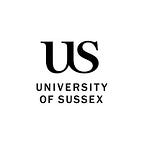“We’ve been holding Zoom cook-alongs and karaoke for our students”
Martin Torjussen is Director of the International Study Centre (ISC) , which gives students from across the globe the opportunity to improve their academic skills and qualifications to access a University of Sussex education.
My background has always been in education. I was a teacher and a head teacher in schools in Brighton and East Sussex before moving into initial teacher training at the University of Brighton, and then I took a career turn to work with their international student Pathways College.
Just two months after I started at the ISC at Sussex last year, we went into the first Covid-19 lockdown.We quickly moved as much as we could online for our 800 students enrolled on our programmes [International Foundation Years, International Year Ones, or Pre-Masters courses] and have been working closely with the University to mirror their changes to teaching during the pandemic.
We have students of more than 40 different nationalities — although nearly a half are Chinese. We worked quickly to address the needs of those who stayed with us because they were unable to go back to their own country, and those who did manage to go back were able to study from home.
Our blended learning provision has resulted in a lot of upskilling for our staff. Initially, some of our South American students joined sessions in the middle of the night, but we in general we have offered alternative classes for students to attend and to timetable students according to time zones.
From the outset we made every effort to maintain personal contact with all our students. This has been challenging, particularly with regards to IT provision. Some of our students have no internet access in their homes and have to go to internet cafés, or there might only be one device in the house being shared by several people. We’re very conscious of the strains on mental health and the challenges that everyone is facing.
We’ve also had students who have had to quarantine on their journey home — first on the stopover and then once they get home, sometimes without devices. It’s down to our team to make sure that students don’t feel left out, or left behind in their learning.
In pre-pandemic times, we celebrated together the festivals and holidays that the students would normally be celebrating in their own countries and cultures. Just before the lockdown last March (2020), we managed to hold a tea party and celebrate lunar new year.
We’ve found ways to continue celebrating our community and diversity during the pandemic. Recently we had dozens of students involved in cook-alongs and karaoke sessions. Students really enjoy seeing Brighton in real-time so we’ve hosted a live wildlife tour of Brighton, and we’ve also hosted a live ghost-hunting tour of Brighton for Halloween.
The ISC was established on campus in 2006, starting with just a couple of students in the early days to now having an annual intake of around 800–900 students — and more than 90 per cent progress to taking degree courses at Sussex.
A common misconception is that the ISC students come here primarily to learn English. In fact, a significant number of them speak very good English, and some come from English-speaking countries. What they may not have are the qualifications to match the criteria needed to enter university. This might be because the educational infrastructure of their own country hasn’t enabled them to meet those international requirements. It’s not that the students aren’t capable, but we do also have students who need support with their English and with their academic skills, so we give parallel provision.
I enjoy the energy of being with young people from different backgrounds and cultures. I feel privileged to be in this environment. And of course, they are getting so much from this too. They are really ambitious and dedicated to getting the most out of studying in the UK and they’re meeting those with from other nations and cultures.
We know there are going to be real challenges ahead for international student recruitment. But I hope the vaccine rollout is a success and that, if the UK can be seen as the first safe place internationally, then I’m optimistic that we’ll soon be able to welcome more students back to campus. Our teams out in the market are certainly telling us that students are still keen to come.
Interview by Jacqui Bealing
www.sussex.ac.uk
